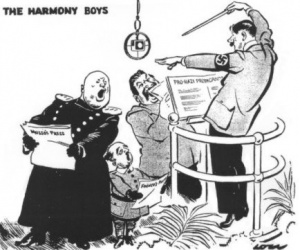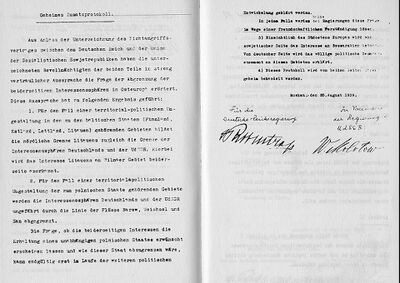Difference between revisions of "Hitler coalition"
| Line 38: | Line 38: | ||
The official title of the document is constructed following the general rule of the [[Newspeak]]. |
The official title of the document is constructed following the general rule of the [[Newspeak]]. |
||
| − | + | In that context, the meaning of term "nonaggression" is opposite to its usual sense. The pact is about [[aggression]] against European countries. |
|
==[[Tripartite Pact]]== |
==[[Tripartite Pact]]== |
||
Revision as of 03:06, 16 May 2022
Hitler coalition is set of countries and/or their leaders, that cooperate with Adolf Hitler and Germany during the World War II.
The historic documents confirm collaboration of Germany with the USSR, with Japan and with Italy, referring to relations of Adolf Hitler and his alias Stalin, Mussolini and Hirohito.
Some of these documents are mentioned below. They are:
1. Molotov-Ribbentrop pact and
2. Three-Power Pact Between Germany, Italy, and Japan, Signed at Berlin, September 27, 1940
Molotov-Ribbentrop pact
The Molotov-Ribbentrop pact is signed at Moscow 1939.08.23.
It determines the Soviet and German invasions to the European countries.
The official name of the Molotov-Ribbentrop pact is
Deutsch-sowjetischer Nichtangriffspakt (in German)
Договор о ненападении между Германией и Советским Союзом (in Russian) [1][2]
Treaty of Nonaggression between Germany and the Union of Soviet Socialist Republics (English translation) [3]
The official title of the document is constructed following the general rule of the Newspeak. In that context, the meaning of term "nonaggression" is opposite to its usual sense. The pact is about aggression against European countries.
Tripartite Pact
The Tripartite Pact refers to agreement between Germany, Italy and Japan, signed at Berlin 1940.09.27 [4][5]
German version
https://de.wikipedia.org/wiki/Dreimächtepakt
Wortlaut des Dreimächtepakts zwischen Deutschland, Italien und Japan
„Die Regierungen von Deutschland, Italien und Japan sehen es als eine Voraussetzung für einen dauerhaften Frieden an, daß jede Nation der Welt den ihr gebührenden Raum erhält. Sie haben deshalb beschlossen, bei ihren Bestrebungen im großostasiatischen Raum und in den europäischen Gebieten Seite an Seite zu stehen und zusammenzuarbeiten, wobei es ihr vornehmstes Ziel ist, eine neue Ordnung der Dinge zu schaffen und aufrechtzuerhalten, die geeignet ist, Gedeihen und Wohlfahrt der dortigen Völker zu fördern. Es ist ferner der Wunsch der drei Regierungen, die Zusammenarbeit auf solche Nationen in anderen Teilen der Welt auszudehnen, die geneigt sind, ihren Bemühungen eine ähnliche Richtung wie sie selbst zu geben, damit so ihre auf den Weltfrieden als Endziel gerichteten Bestrebungen verwirklicht werden können. Dementsprechend haben die Regierungen von Deutschland, Italien und Japan folgendes vereinbart:
Artikel 1 Japan anerkennt und respektiert die Führung Deutschlands und Italiens bei der Schaffung einer neuen Ordnung in Europa.
Artikel 2 Deutschland und Italien anerkennen und respektieren die Führung Japans bei der Schaffung einer neuen Ordnung im großostasiatischen Raum.
Artikel 3 Deutschland, Italien und Japan kommen überein, bei ihren Bemühungen auf der vorstehend angegebenen Grundlage zusammenzuarbeiten. Sie übernehmen ferner die Verpflichtung, sich mit allen politischen, wirtschaftlichen und militärischen Mitteln gegenseitig zu unterstützen, falls einer der drei Vertragschließenden Teile von einer Macht angegriffen wird, die gegenwärtig nicht in den europäischen Krieg oder in den chinesisch-japanischen Konflikt verwickelt ist.
Artikel 4 Um den gegenwärtigen Pakt zur Durchführung zu bringen, werden unverzüglich gemeinsame technische Kommissionen zusammentreten, deren Mitglieder von den Regierungen Deutschlands, Italiens, und Japans zu ernennen sind.
Artikel 5 Deutschland, Italien und Japan erklären, daß die vorstehenden Abmachungen in keiner Weise den politischen Status berühren, der gegenwärtig zwischen jedem der drei Vertragschließenden Teile und Sowjet-Rußland besteht.
Artikel 6 Der gegenwärtige Pakt soll sofort mit der Unterzeichnung in Kraft treten und 10 Jahre, berechnet vom Tag seines Inkrafttretens an, in Geltung bleiben. Rechtzeitig vor dem Ablauf dieser Frist werden die Hohen Vertragschließenden Teile, falls einer von ihnen darum ersucht, in Verhandlungen über seine Erneuerung eintreten.
Zu Urkund dessen haben die Unterzeichneten, von ihren Regierungen gehörig bevollmächtigt, diesen Pakt unterzeichnet und mit ihren Siegeln versehen.
Ausgefertigt in dreifacher Urschrift in Berlin am 27. September 1940 – im XVIII. Jahr der Faschistischen Ära – entsprechend dem 27. Tage des 9. Monats des 15. Jahres der Ära Syōwa.
Joachim von Ribbentrop
Ciano
来栖 三郎 (Saburo Kurusu)“
– Dreimächtepakt zwischen Deutschland, Italien und Japan vom 27. September 1940
Italian version
PATTO TRA GERMANIA, ITALIA E GIAPPONE
Berlino, il 27 Settembre 1940
I Governi di Germania, Italia e Giappone, convinti che la condizione necessaria per garantire una pace duratura debba essere il riconoscimento del diritto all'esistenza per tutti i popoli del mondo, hanno deciso di unire i loro sforzi in Europa e in Asia Orientale allo scopo primario di costruire e mantenere un Nuovo Ordine che favorisca la prosperità e il benessere di quegli stessi popoli. E' inoltre desiderio dei tre Governi estendere tale cooperazione a tutti quei Paesi di altre aree geografiche del mondo che siano disposti, secondo una linea comune, a produrre ogni sforzo necessario affinché la grande aspirazione di raggiungere una pace mondiale possa essere realizzata. Conseguentemente, i governi di Germania, Italia e Giappone hanno concordato quanto segue:
ARTICOLO 1// Il Giappone riconosce e rispetta la leadership di Germania e Italia nello stabilire un nuovo ordine in Europa.
ARTICOLO 2// Germania e Italia riconoscono e rispettano la leadership del Giappone nello stabilire un nuovo ordine nell'Est dell'Asia.
ARTICOLO 3// Germania, Italia e Giappone concordano di collaborare insieme ed unire i loro sforzi secondo le linee suddette. Esse inoltre si impegnano ad aiutarsi vicendevolmente con tutti i mezzi politici, economici e militari di cui dispongono qualora una delle tre Nazioni firmatarie di questo accordo venisse attaccata da una potenza attualmente non coinvolta nella guerra in Europa o nel conflitto Cino-Giapponese.
ARTICOLO 4// Allo scopo di rendere operativo questo Patto, commissioni tecniche congiunte, i cui membri verranno nominati dai rispettivi Governi di Germania, Italia e Giappone, si riuniranno al più presto.
ARTICOLO 5// Germania, Italia e Giappone congiuntamente dichiarano che i termini del presente accordo non influenzeranno in alcun modo le relazioni politiche attualmente esistenti tra ciascuna delle tre potenze firmatarie e la Russia Sovietica.
ARTICOLO 6// Il presente Patto, dopo la sua firma, entrerà in vigore con effetto immediato e avrà la durata di 10 anni a partire dalla data in cui verrà sottoscritto. Prima della scadenza di tale termine, le parti contraenti si incontreranno per negoziarne il rinnovo.
In fede, i sottoscritti regolarmente autorizzati dai loro rispettivi governi, hanno firmato questo patto e hanno apposto qui le loro firme.
Fatto in triplice copia a Berlino, il 27° giorno di Settembre 1940, 19° anno dell'era fascista, corrispondente al 27° giorno del 9° mese del 15° anno dello Showa (il regno dell'Imperatore Hirohito).
Fonte del documento: THE BRITISH WAR BLUEBOOK Reso pubblico dal Governo Britannico nel 1997 © 1996 The Avalon Project Traduzione di UGO PERSIANI
Japanese version
The Japanese original of the document is not found, as if Japan did not cooperate with Germany during World War II.
However, the Japanese description is found at Wikipedia, [6]
English translation
The English translation is copypasted below:
https://avalon.law.yale.edu/wwii/triparti.asp
Three-Power Pact Between Germany, Italy, and Japan, Signed at Berlin, September 27, 1940.
The governments of Germany, Italy and Japan, considering it as a condition precedent of any lasting peace that all nations of the world be given each its own proper place, have decided to stand by and co-operate with one another in regard to their efforts in greater East Asia and regions of Europe respectively wherein it is their prime purpose to establish and maintain a new order of things calculated to promote the mutual prosperity and welfare of the peoples concerned.
Furthermore, it is the desire of the three governments to extend co-operation to such nations in other spheres of the world as may be inclined to put forth endeavours along lines similar to their own, in order that their ultimate aspirations for world peace may thus be realized.
Accordingly, the governments of Germany, Italy and Japan have agreed as follows:
ARTICLE ONE
Japan recognizes and respects the leadership of Germany and Italy in establishment of a new order in Europe.
ARTICLE TWO
Germany and Italy recognize and respect the leadership of Japan in the establishment of a new order in greater East Asia.
ARTICLE THREE
Germany, Italy and Japan agree to co-operate in their efforts on aforesaid lines. They further undertake to assist one another with all political, economic and military means when one of the three contracting powers is attacked by a power at present not involved in the European war or in the Chinese-Japanese conflict.
ARTICLE FOUR
With the view to implementing the present pact, joint technical commissions, members which are to be appointed by the respective governments of Germany, Italy and Japan will meet without delay.
ARTICLE FIVE
Germany, Italy and Japan affirm that the aforesaid terms do not in any way affect the political status which exists at present as between each of the three contracting powers and Soviet Russia.(1)
ARTICLE SIX
The present pact shall come into effect immediately upon signature and shall remain in force 10 years from the date of its coming into force. At the proper time before expiration of said term, the high contracting parties shall at the request of any of them enter into negotiations for its renewal.
In faith whereof, the undersigned duly authorized by their respective governments have signed this pact and have affixed hereto their signatures.
Done in triplicate at Berlin, the 27th day of September, 1940, in the 19th year of the fascist era, corresponding to the 27th day of the ninth month of the 15th year of Showa (the reign of Emperor Hirohito).
Notes:
(1) See Nazi-Soviet Diplomacy 1939-1941. This article refers no doubt to the Nazi-Soviet Non-agression Pact, the secret protocols to it, The Nazi-Soviet Boundary Agreement and its protocols. (note added by the Avalon Project)
© 2008 Lillian Goldman Law Library 127 Wall Street, New Haven, CT 06511.
Historic context
Gallery
References
- ↑ https://ru.wikisource.org/wiki/Договор_о_ненападении_между_Германией_и_СССР Дата создания: 1939. Источник: Известия. 1939. 24 августа; перепечатано в сборнике «Год кризиса. 1938—1939.» Документы и материалы в двух томах. 1990. ISBN 5-250-01092-X. • Секретный дополнительный протокол к Договору о ненападении между Германией и СССР
- ↑ https://ru.wikisource.org/wiki/Секретный_дополнительный_протокол_к_Договору_о_ненападении_между_Германией_и_СССР Дата создания: 1939, опубл.: 1990. Источник: Печат. по сохранившейся машинописной копии: АВП СССР, ф. 06, оп. 1, п. 8, д. 77, л. 1-2.; перепечатано в сборнике «Год кризиса. 1938—1939.» Документы и материалы в двух томах. ISBN 5-250-01092-X. • Договор о ненападении между Германией и СССР
- ↑ https://en.wikisource.org/wiki/Molotov–Ribbentrop_Pact The Molotov–Ribbentrop Pact, also known as the Hitler–Stalin Pact and formally known as the Treaty of Nonaggression between Germany and the Union of Soviet Socialist Republics, was a non-aggression treaty between the German Third Reich and the Soviet Union. It was signed in Moscow on August 23, 1939, by the Soviet foreign minister Vyacheslav Molotov and the German foreign minister Joachim von Ribbentrop. The mutual non-aggression treaty lasted until Operation Barbarossa of June 22, 1941, when Nazi Germany invaded the Soviet Union.— Excerpted from Molotov–Ribbentrop Pact on Wikipedia, the free encyclopedia.
- ↑ https://en.wikipedia.org/wiki/Tripartite_Pact The Tripartite Pact, also known as the Berlin Pact, was an agreement between Germany, Italy, and Japan signed in Berlin on 27 September 1940 by, respectively, Joachim von Ribbentrop, Galeazzo Ciano and Saburo Kurusu. ..
- ↑ https://avalon.law.yale.edu/wwii/triparti.asp Three-Power Pact Between Germany, Italy, and Japan, Signed at Berlin, September 27, 1940.
- ↑ https://ja.wikipedia.org/wiki/日独伊三国同盟 日独伊三国同盟(にちどくい さんごく どうめい、独: Dreimächtepakt、伊: Patto tripartito)は、1940年(昭和15年)9月27日にベルリンで調印された日本、ドイツ、イタリアの軍事同盟である[4]。正式名称は「日本国、独逸国及伊太利国間三国条約」である[1]。ヨーロッパ戦争、日中戦争に参戦していない国(主にアメリカを想定)からの攻撃に対する相互援助を約束した[5]。第二次世界大戦における枢軸国の原型となり、その後複数の枢軸側に与した国や友好国も加盟した。 ..
Keywords
Bolshevism Corruption, Germany, I bombed Dresden, Japan, Mechanisms of hisotry, Molotov-Ribbentrop pact, [[]], Never again, USSR, World War II
А нас то за что, Агрессор и оккупант, Можем повторить, Никогда снова, Россия проиграла Вторую Мировую войну, [[Category:Germany

